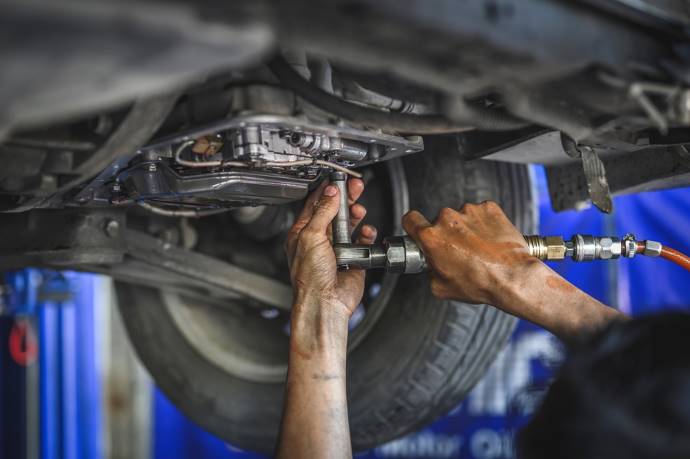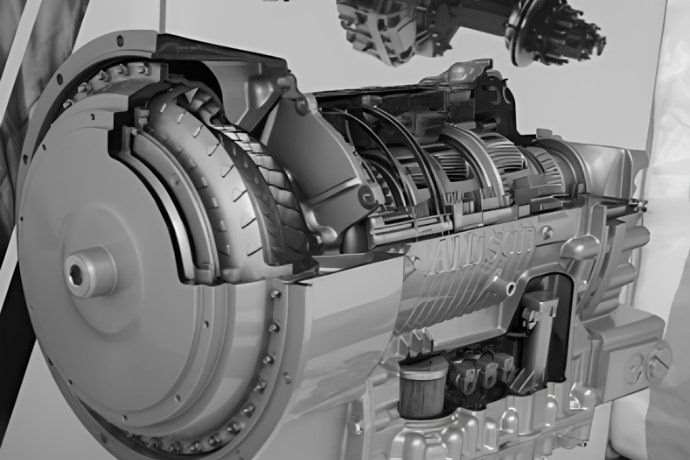The Allison 1000 transmission is a popular and reliable automatic transmission used in many heavy-duty GM trucks.
It has an excellent reputation, but it’s not without issues.
As a vehicle owner, you should know some common Allison 1000 transmission problems and their solutions.
In this article, I have talked about Allison 1000 transmission problems, their symptoms, and solutions.
Allison 1000 Transmission Problems [05 Problems and Solutions]
Allison 1000 transmission has 5 common problems, including the torque converter, TCM module, shift selector shifting problem, limp mode, and installation issues.
Some owners also reported valve body and water pump issues, which are rare.
1. Allison 1000 Transmission Limp Mode
There’s a safety feature called limp mode on Allison 1000 transmissions.
The TCM, or transmission control module, activates the mode whenever the transmission sustains significant damage.
Now you may want to know what causes the Allison transmission to go into limp mode.
Allison 1000 transmission goes into limp mode due to five causes.
- Overheating
- A clogged transmission filter
- Low transmission fluid levels
- A faulty solenoid
- Excessive loads, etc.
When the limp mode is activated, the transmission locks itself into third gear, reducing the vehicle’s speed.
Allison 1000 Transmission Limp Mode Fix
There are 2 ways of fixing the Allison 1000 transmission’s limp mode:
- Manually diagnose and fix the cause of the limp mode.
- Reset the limp mode using an OBD-II scanner.
If you’re doing a manual diagnosis, you have to:
- Switch the engine off and restart to reset the limp mode.
- If the limp mode is not reset, check the fluid level. If the fluid level is low, fill it to the required amount.
- Check the air filter and replace it if it is faulty.
- Check the MAF, or Mass Air Flow sensor, and replace it if it is defective.
Another way to fix limp mode is through advanced diagnosis.
In this case, you can use an OBD-II scanner to find out the actual reason for the limp mode and fix the problem.
After resolving the specific issue, restart the vehicle, and the limp mode will disappear.
2. Torque Converter Issue

The Allison transmission torque converter is relatively weak and causes problems sometimes.
But consumer reports against the Allison transmission’s faulty torque converter are very low.
You must address the issue to raise awareness.
Symptoms of a Faulty Torque Converter
- Transmission overheating
- Transmission slipping
- Loss of acceleration
- Fluid leaks
- Shuddering or vibrating
- Unusual noise.
How to Fix Bad Torque Converter
The symptoms of a bad torque converter help you identify which component causes the problem.
Torque converters can occasionally fail due to transmission fluid.
So, you must check the transmission fluid level and quality when experiencing faulty torque converter symptoms.
If the torque converter is faulty, you may need to replace it and reinstall the transmission again.
In this case, you can take your vehicle to a repair shop for proper treatment.
If you are able to replace the torque converter yourself, it will cost you around $200 to $500.
On the other hand, in a repair shop, a torque converter replacement costs $700 to $1000.
You can watch this video to learn how to fix the torque converter shudder.
3. TCM Module Issue
The Allison 1000 transmission was released in the mid-2000s.
The Allison 1000 transmission was recalled due to the TCM module issue.
Therefore, if you have never replaced Allison 1000 transmissions, you should contact the manufacturer for the replacement process.
When the TMC module fails to function properly, you will experience the following symptoms:
- Hard shifting or no shifting issue
- Stuck in the limp mode
- Erratic shifting
- Check engine light illuminates.
4. Shifting Problem
A number of Allison 1000 transmission users also reported shifting problems, such as harsh shifting, slipping, or delayed engagement.
However, the shifting problem mainly occurs for the following reasons:
- low or dirty transmission fluid levels
- worn-out transmission components
- faulty solenoids.
The Allison 1000 transmission isn’t directly involved with shifting problems.
So, if you are having a transmission shifting issue, first check out the points listed above to resolve the issue.
5. Installation Issues

Sometimes the Allison transmission will not work properly or completely stop working.
Incorrect transmission installation is most likely to blame.
Transmission installation is a challenging task that requires expertise.
Therefore, when reinstalling the transmission, you must take great care, or you can have a qualified mechanic do it for you.
You should check the vacuum lines and other connected components of the transmission.
If you notice anything out of place, make the necessary adjustments to fix transmission problems.
Watch this video to learn how to install Allison 1000 transmission.
Is the Allison 1000 a Good Transmission
Yes, the Allison 1000 is a good transmission.
It has a strong reputation for reliability and durability.
When shifting gears, Allison transmissions do not experience power interruptions.
As a result, the transmission provides more power to the wheels by effectively using the engine’s torque and horsepower.
However, the Allison 1000 transmission has some common problems, like any other transmission.
You can prevent or reduce transmission problems by performing regular maintenance.
FAQs
How reliable is the Allison 1000 transmission oil pump?
The Allison 1000 transmission oil pump is reliable.
However, the oil pump loses efficiency over time and struggles to produce pressure quickly.
Allison’s central pump gear functions similarly to engine oil pumps, with one gear housed inside the other in two gears.
How often should you change Allison 1000 transmission fluid?
You should change Allison 1000 transmission fluid every 25,000 to 50,000 miles.
Generally, it depends on the vehicle’s use.
If you use your vehicle for regular jobs and tow heavy loads, you should change your transmission oil every 25,000 to 30,000 miles.
On the other hand, if you are constantly using your vehicle and rarely towing heavy loads, you can change the transmission fluid every 50,000 to 60,000 miles.
However, the best advice is to consult your owner’s manual for accurate information on changing Allison 1000 transmission fluid.
How much horsepower can a stock Allison 1000 handle?
The horsepower a stock Allison 1000 transmission can handle depends on several factors.
The factors include the transmission model, the use of the transmission, and the vehicle on which it is installed.
Generally, the 5-speed stock Allison 1000 transmission can handle roughly 355 to 400 rwhp (Rear Wheel Horsepower).
While the 6-speed Allison 1000 transmission can handle roughly 430 to 450 rwhp.
How often should you change the internal filter in an Allison 1000 transmission?
Generally, you should change the internal filter in an Allison 1000 transmission every 70,000 to 100,000 miles.
External filters should be replaced more frequently than internal filters.
This is because the external filter captures more debris and contaminants before they enter the internal filter.
What happens if you don’t change transmission filter?
If you don’t change the transmission filter for a long time, the filter will be clogged with dirt, debris, and other contaminants.
As a result of a clogged transmission filter, shifting issues, transmission slipping, gear grinding, and other transmission problems can occur.
Final Thoughts
The Allison 1000 transmission is reliable and durable.
However, the transmission has some common problems, and the company also recalls it for Transmission Control Module (TCM) problems.
Some problems are easy to resolve, while others are expensive.
Despite this, the Allison 1000 transmission performs well considering all factors.
Furthermore, regular maintenance, such as changing filters and transmission fluid according to the manufacturer’s recommendation, can prevent problems and ensure optimal performance.
This can also extend the transmission’s life and reduce the risk of premature wear.
Want to explore more about Allison transmissions? Check out the following articles:


